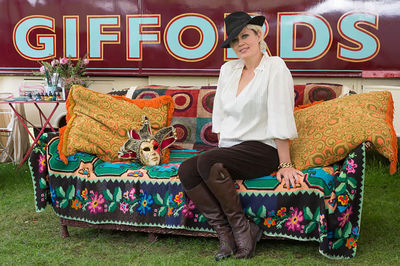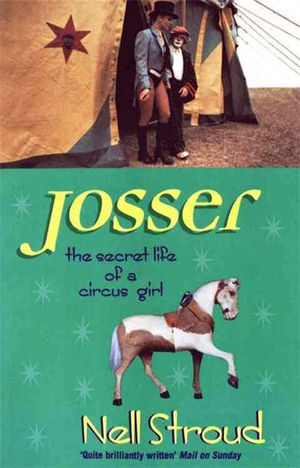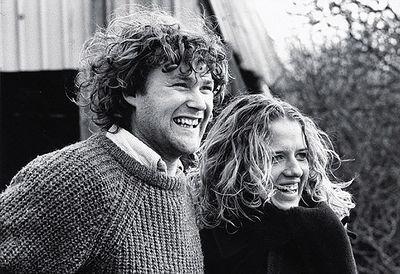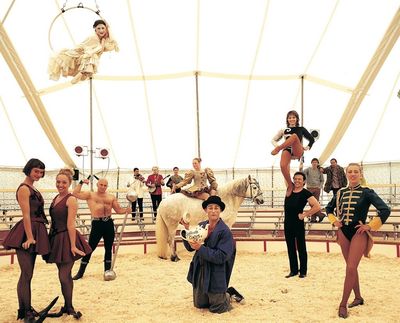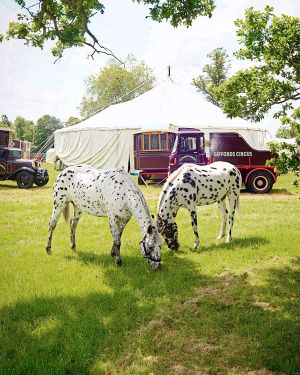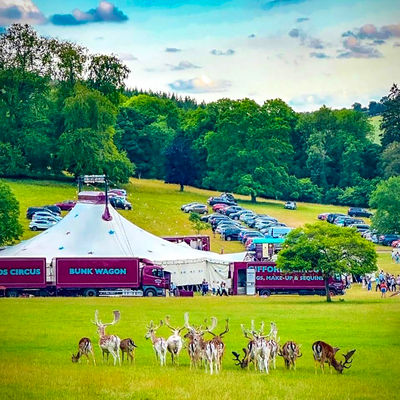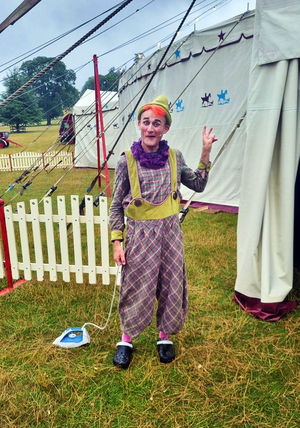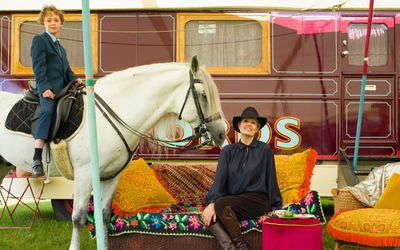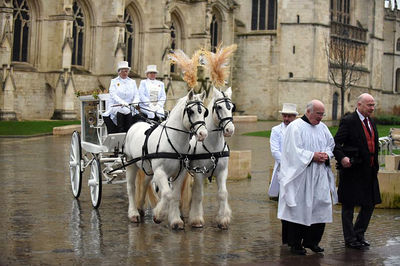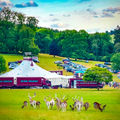Nell Gifford
From Circopedia
Equestrienne, Circus Owner
By Dominique Jando
The founder of England’s Giffords Circus, Nell Gifford (1974-2019) wrote: "A good circus is a sublimely existential thing, living acutely and only for the present moment." She also wrote: "A good circus should make you cry." She created a circus conform to these ideas, a circus with a soul, which understands its purpose. In time, Giffords Circus has generated an amazingly faithful and enthusiastic following in the countryside of the south of England—not a large territory, but Nell Gifford wanted hers to be a "village-green circus." And indeed, Giffords Circus has this unique quality: it takes its audience into a nostalgic world of quaint simplicity and tangible wonder.
Nell Gifford was born Eleanor Rose Stroud on January 24, 1974 in Oxford. Her father, Rick Stroud, was a successful television director and producer, and her mother, Charlotte, née Pumphrey and known as Char, was also artistically inclined. Char had three children from her first marriage with publisher Matthew Bridgewater, among whom Emma Bridgewater, the founder of the eponymous British pottery and ceramics manufacturing company. Nell also had a younger sister, Clover Stroud (b.1975), who became a successful writer. When Nell was ten, the family moved from Oxford to a farm in a village called Minety, in Wiltshire. In the English countryside, horse riding is an integral part of life and Nell became indeed a horse enthusiast.
Yet, it is a catastrophic riding accident that brought tragedy into the Stroud and Bridgewater families. In 1991, Char fell from her horse while hunting and suffered a head injury that left her in a coma for two weeks and kept her mentally incapacitated for the following twenty-two years (she passed away in 2013). At the time of the accident, Nell and Clover were eighteen and sixteen respectively and, in effect, they had suddenly lost the brilliant person they had known as their mother. Their lives changed forever.
Apprenticeship: An Oxford Graduate Riding an Elephant
By then, Nell had secured a place to study English literature at Oxford’s New College. She took a short break to go to the United States at the invitation of Gerald Balding, a relative by marriage of one of her stepbrothers and, most importantly, a nephew of Ivor David Balding, who had co-founded Circus Flora in 1985—a very successful theatrical, yet traditional circus based in St. Louis, Missouri. Nell went to help at the circus during its short annual season, doing everything from tent set-up to ushering the public, and making herself useful in every possible way. This was an epiphany: Circus proved to be a place where she could find comfort at this difficult stage of her life. She also took an instant liking to circus life.She returned to Oxford and the university, but her mind was now set on creating her own circus. For the five years following her graduation (with a degree in English Literature), Nell hit the road and worked with various circuses in the U.K., notably Peter Gandey’s Chinese State Circus, and Santus Circus, "Le Cirque de France," a show ran in the United Kingdom by an old French circus family. There, she did everything: "I sold tickets, ice cream, hot dogs and sparkly wands (…) I drove vans and lorries, and towed caravans in endless night convoys, swung sledge hammers, pulled our tent canvas and raked sawdust. I rode Arab horses and an elephant, Beverley…"
When working with the Santus family, Nell also helped them with their administrative work, booked the lots where the circus was to set up, and lobbied city and village authorities to get a fair treatment for the circus: "I felt indignation on the behalf of the resigned circus directors for the non-stop bullying levied at them from every sector – the local authorities, the public, the police…" She learned the circus the hard way, and yet, as she said, "for a moment you think you know it all and then you realise that actually you know nothing; that you are only at a starting point."
In 1998, Yasmine Smart was hired to work with her horses at Circus Roncalli in Germany, and she offered Nell a job as a groom: It was a great opportunity, and Nell jumped on it. Once there, she was overwhelmed by Bernhard Paul’s very successful circus, its pristine looks, its style, its show, and also the respect that such circuses enjoyed on the Continent. It was a second epiphany. As she put it, "I was a gauche 18-year-old again caught in the headlights of a circus show that seemed to encapsulate everything I wanted in life."
Enter Nell Gifford
Meanwhile, Nell had met in England a landscape gardener, Toti Gifford. They had fallen in love and, upon her return from Germany in 1999, they reunited and got married. Toti and Nell settled in a caravan on a farm in Bourton on the Water, in Gloucestershire’s Cotswolds District, and began to draw plans to create their own circus. At the same time, Nell wrote and published her first book about her circus experiences: Josser: Days and Nights in the Circus. (A josser, in English circus lingo, is a circus outsider.)Creating a circus from scratch is not an easy matter and, living only on Toti’s income, the couple was financially very tight. Yet, they managed in time to buy a large second-hand party tent that could serve as a big topThe circus tent. America: The main tent of a traveling circus, where the show is performed, as opposed to the other tops. (French, Russian: Chapiteau), and Toti found and restored run-down traveling wagons that were transformed into old-time circus wagons with an elegant burgundy and cream livery and hand-painted adornments and name. Since they wanted to create a true family circus that visited village greens, their own family name was, it seemed to them, the most appropriate title: Their enterprise was named Giffords Circus.
The wagons’ look (as well as the content of the early shows) owed much to Roncalli’s influence: No less than its contents, the package itself had to tell an enchanting story. Restoring old wagons was only one part of the daunting work that was awaiting them, though: Everything else had to be built. They set up to work in a space put at their disposal by Toti’s grandfather in nearby Cheltenham. There was also a sense of urgency because Nell had made a bold move: As a newly published author, she had been invited to participate in the 2000 Hay Festival of Literature and Arts at Hay-on-Wye in Wales, and she offered to bring her circus there for the occasion. Since her book was about her circus experiences, the Festival agreed. It was in October 1999; at that point, Giffords Circus existed only on paper—and the festival was scheduled for May 2000: They had an imperative deadline!
They gathered a motley group of "runaways, convicts, and people who had consciously absconded from the modern world" whom they have met during the fruit-picking season. Each of them had specific talents that could be used in building the circus. Then they ran out of money and Toti had to sell his landscaping machinery and their car. They ran into debts. Then came Gerald Balding, who had introduced Nell to the circus world in the first place. Balding joined the team and asked a crucial question: What will be in the show?Balding’s enthusiasm rejuvenated the spirits of a crew that was indeed tired and sometimes despairing. Nell began to shift her attention to the contents of the show, its looks, what Balding called "one little bubble of magic in that tent." Auditions for dancers (a Roncalli mainstay) and acts were held at Cheltenham’s Playhouse Theatre. Nell had invited her friends Julie and Michelle Fossett to sit on the panel and provide an expert circus eye to the process. Few people showed up, but they found three dancers, a juggler and a contortionist.
Nell was indeed the house equestrian ("A world without horses is no world for the circus" she wrote quite rightly) and she also found a rope dancer and, through friends, gathered a small orchestra. Bit by bit, Giffords Circus’s first company was built, costumes were sewn. An old ring curb(American. French: Banquette. Russian: Barrier) The circular barrier that defines the ring, and separates it from the audience. was borrowed from a circus family, and old garden chairs were purchased to compensate the absence of a proper seating system. When time came to set up the tent in Cheltenham for rehearsals, the circus didn’t have yet a single truck to move wagons and equipment. Friends and local farmers had to come to the rescue.
The Little Circus That Could
However, Nell was elated to discover that all the festival’s performances of Giffords Circus were already sold out! As it happened, the Circus had become the festival’s most anticipated event, even though no one had ever heard of it—but apparently, the festival-goers had heard of Nell Stroud, the author, and her circus adventures, and this was enough to trigger their curiosity. When the show finally opened in front of its audience in Hay—a true paying audience—it was an unmitigated success!
The "little bubble of magic" had hit home. It was not, by far, the United Kingdom’s largest circus, as traditional competitors would have loved to advertise, neither did it have "a galaxy of international talent," but Giffords Circus was intimate, personable, unpretentious, artistically meaningful, and most importantly, it had a style of its own, a distinctive charm, and a soul. It was also, and would remain, audience-friendly—in that it was entirely conceived with its audience’s pleasure in mind. Nell said she wanted to "bring happiness, imagination and enliven people’s souls," and she had succeeded.
Victoria Lambert, a journalist from The Telegraph, has described the "ritual" of the Giffords Circus experience thus: "That first thrill from hearing the organ music playing invitingly as you park the car and walk, often across a muddy field, to the Big Top. Stopping at the wagon to buy this year’s commemorative rosettes and Emma Bridgewater mugs. Berating yourself for not booking a spot at Circus Sauce, the pop-up café. Then catching sight of the distinctive maroon livery of the wagons with their hand-painted signs, accompanied by a surge of uncomplicated joy from the flap of the bunting, the sound of horses and dogs and harnesses jangling. The smell of the sawdust, the roar of the middle-class Boden-wearing crowd: everywhere is colour and exuberance…”So, in Hay, Giffords Circus had shown that it could enthrall an audience; but more significantly for the enterprise’s survival, it received a lot of media attention. All of a sudden, Gifford Circus was not an unknown entity anymore; it was now on the map and generated a fair amount of curiosity. Its small size made it easier to play to full houses, and full houses, in the eye of any audience, mean success. In the villages where it performed, Giffords Circus would soon become a must-see. Before that, it had to strengthen itself and move from a dream come true to a viable enterprise.
Nell and Toti spent most of the next two years developing systems in order to structure the circus administration, prepare the tours, hire the acts and personnel, produce the shows. They revamped the circus’s transportation method (which was obviously in a severe need of reform) and completed the big topThe circus tent. America: The main tent of a traveling circus, where the show is performed, as opposed to the other tops. (French, Russian: Chapiteau) equipment with the addition of a proper seating system and other necessary amenities. They also began to establish a touring circuit (limited to the South East of England) that would generate in time a faithful returning audience. And Nell and Toti started traveling abroad to see other circuses (including in Moscow) and find fresh talent.
Giffords Circus Finds Its Marks
It may have had a style of its own, but Giffords’s show format was based upon Circus Roncalli’s: A series of acts independent from one another, tied together by dancers who appeared between them, and a strong company spirit. But Giffords Circus catered now to a returning audience and Nell thought the productions should be developed each year around a different theme. This was not a new concept: Liana Orfei in Italy in the 1970s and, since the 1980s in France, Alexis Gruss, Jr.’s Le Cirque à l’Ancienne had successfully developed the idea, and had been followed by such successful circuses as New York’s Big Apple Circus , Canada’s Cirque du Soleil and, perhaps most significantly, by Nell’s own alma mater, Circus Flora.
In 2003, Giffords Circus was awarded a grant to create a new production from scratch. From the script down to the design of the costumes and their fabrication, Nell began working on what will become her first titled production, Pearl. It would be the first of a long series that has included such diverse creations as Love (2006); Yasmine (2010), which was a biographical tribute to Yasmine Smart; War and Peace (2011), inspired by Tolstoy’s novel; The Painted Wagon (2016); and the last two shows Nell Gifford brought to fruition, My Beautiful Circus (2018) and Xanadu (2019), whose titles, in view of what was threatening Nell’s very own life then, were quite evocative.For these new productions, Nell Gifford chose to bring outside directors, recognizing that as good a conceptual artist she might have been, directing was not her forte (Carl McCrystal, a successful West End stage director, has served in that capacity since 2012). Yet, 2003 was a landmark year for more than one reason.
That year, the clown Tweedy (Alan Digweed), formerly of Zippo’s Circus, joined the company and quickly became an audience’s favorite—and, in time, an iconic figure of Giffords Circus and the central character of its productions. 2003 also saw the creation of The Circus Sauce, a traveling gourmet restaurant under canvas that caters to the audience after the show—or at least, the part of the audience that had the forethought to make a reservation ahead of time! The success of this unique restaurant was immediate, and it has become such a beloved fixture of Giffords Circus that it had to grow in size in order to accommodate an ever-increasing number of customers.
Touring from April to September in the southeast of England from village greens to public and private parks (where it stays one or two weeks on average), Giffords Circus has found its own identity, different from any other circus in the United Kingdom and even in continental Europe. It has built a faithful audience that would never miss an annual visit to its intimate big topThe circus tent. America: The main tent of a traveling circus, where the show is performed, as opposed to the other tops. (French, Russian: Chapiteau), rain or shine! In 2010, Toti and Nell Gifford celebrated the tenth anniversary of Nell’s dream circus. For the occasion, Nell Gifford conceived and wrote a coffee-table book, Giffords Circus – The First Ten Years, which was published in 2014. Nobody then could see the clouds that were insidiously gathering over the fairy tale.
Such Stuff as Dreams Are Made On
Nell Gifford lived the circus life she had dreamt for herself, preparing the next season in her and Toti’s farm in the Costwolds, and living the rest of the year the nomadic existence of traveling entertainers in her living wagon, surrounded by her horses and her company, belonging to one of these magical villages whose only anchor is an itinerant big topThe circus tent. America: The main tent of a traveling circus, where the show is performed, as opposed to the other tops. (French, Russian: Chapiteau). In 2010, she gave birth to twins, Cecil and Red (a boy and a girl), who followed their parents on tour and learned to become true circus kids.Yet, if her circus and her children provided Nell with all the emotional comforts she needed, her marriage, on the other hand, was falling apart. She and Toti eventually divorced in 2015. As if to make matters worse, soon after, that very same year, Nell was diagnosed with breast cancer. Ever the positive, strong-willed woman, Nell decided to fight the disease without leaving her circus out of sight. She continued tending to it between chemo sessions, finding solace in her work and comfort in the warmth of her living wagon.
Remission came and went—twice. In 2018, Yasmine Smart had to come and replace her in the show. Meanwhile, Nell continued to fight and began to consolidate her organization to ensure that, be that as it may, her circus could continue without her; she had no illusions and made her team and her young children aware of the possibility of a bad outcome—yet she never lost her positive attitude or allowed tragedy to settle in. In 2019, she went on tour as usual, with a brand-new big topThe circus tent. America: The main tent of a traveling circus, where the show is performed, as opposed to the other tops. (French, Russian: Chapiteau), and performed in Giffords Circus’s production of Xanadu.
Ultimately, Nell Gifford lost her fight against cancer: She passed away on December 8, 2019. She was only forty-five years old. She had been preparing Giffords Circus’s 2020 production, The Hooley, which marked the twentieth anniversary of her circus’s adventure—sadly, an anniversary she was not allowed to celebrate. Her passing was a tragic loss to many—her family and her friends as well as her audiences—and it was widely commented by the English medias, which saluted Nell’s remarkable achievements and her unique and extraordinary personality.Nell Gifford’s funeral was held on January 13, 2020, at the Gloucester Cathedral, where her white coffin was brought to the church on a white hearse led by a couple of white-harnessed grays. More than 1,200 participants attended the ceremony, friends, colleagues and admirers, including many personalities of the arts—among whom the actress Helena Bonham Carter, who read Prospero's farewell speech from Shakespeare's The Tempest: "…Our revels now are ended. These our actors, as I foretold you, were all spirits, and are melted into air, into thin air (…) We are such stuff as dreams are made on; and our little life is rounded with a sleep…"
As she had wished, Giffords Circus has continued and its success today is a testament to the soundness of her vision. In an interview she gave to The Guardian in 2018, Nell Gifford had said: "When I was young, my mother often used to say, 'Nell, you are SUCH a drama queen.' And it’s true, everything I do seems to be a massive drama. I’ve had cancer not once but twice. I didn’t have one baby, I had twins. And I started my own circus. My mother was right. It’s all so dramatic and full-on."
Suggested Reading
- Nell Stroud, Josser – Days and Nights in the Circus (London, Little, Brown and Company, 1999) — ISBN 0-316-84839-5
- Nell Gifford, Giffords Circus – The First Ten Years (Stroud, The History Press, 2014) — ISBN 978-0-7524-8918-6
- Nell Gifford & Briony May Smith, Nell & the Circus of Dreams (Oxford, Oxford University Press, 2019) — ISBN 978-0-19-276594-9
- Nell Gifford and Ole Hales, Giffords Circus Cookbook (London, Quadrille Publishing, 2020) — ISBN 978-1-78713413-3
External Link
See Also
- Video: Giffords Circus's promotional trailer for Any Port in a Storm (2017)
- Video: Giffords Circus's promotional trailer for My Beautiful Circus (2018)
- Video: Giffords Circus in Transit, promotional video (2021)
- Video: Gifords Circus aerial video (2021)
